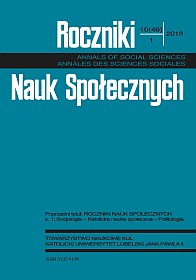Human Security as a Paradigm of European Union Security Policy in Times of Crisis
Abstract
This paper examines whether or not the Human Security approach is a paradigm of EU security policy. It focuses on two recently published EU documents: the European Agenda on Security (EAS) and the EU Global Strategy (EUGS). First, the concept of Human Security is explained. Next, the methodology of the research is presented, in which three questions are posed to identify the presence of the Human Security approach: Are they concerned with the security of people? Are threats broadly defined? Are entities that execute the EU’s security policy broadly defined? Analysis conducted within this paper shows that the EAS and EUGS have been built on the Human Security approach, meaning that it is a paradigm for EU security policy. In the conclusion, the author wonders whether the Human Security approach is well-suited to new challenges for security that have arisen in Europe after Russian aggression in Ukraine.
References
Argomaniz J., Bures O., Kaunert Ch., A Decade of EU Counter-Terrorism and Intelligence: A Critical Assessment, „Intelligence and National Security” 30 (2015), nr 2-3, s. 191-206.
Bajpai K., The idea of Human Security, „International Studies” 40 (2003), s. 195-228.
Campos I.C., Promotion of Human Security in EU External Policy, Reykjavík: Stjórnmálafræðideild 2014.
Chudziak M., Frymark K., Gotkowska J., Niemcy–Turcja: wycofanie żołnierzy Bundeswehry konsekwencją politycznych sporów, 21.06.2017, https://www.osw.waw.pl/pl/publikacje/analizy/2017-06-21/niemcy-turcja-wycofanie-zolnierzy-bundeswehry-konsek wencja [dostęp: 26.06.2017].
Coelmont J., The EUGS: Realistic, but Not Too Modest, Please, „The International Spectator” 51 (2016), nr 3, s. 9-11.
Communication from the Commission to the European Parliament, the European Council, the Council, the European Economic and Social Committee and the Committee of the Regions, European Defence Action Plan, Brussels: 30.11.2016, COM(2016) 950 final, https://eeas.europa.eu/sites/eeas/files/com_2016_950_f1_communication_from_commission_to_inst_en_v5_p1_869631.pdf [dostęp: 27.06.2017].
Conley H.A., The Birth of a Global Strategy amid Deep Crisis, „The International Spectator” 51 (2016), nr 3, s. 12-14.
Frymark K., Popławski K., Niemcy: Walka z dezinformacją i mową nienawiści w Internecie, 12.04.2017, https://www.osw.waw.pl/pl/publikacje/analizy/2017-04-12/niemcy-walka-z-dezinformacja-i-mowa-nienawisci-w-internecie [dostęp: 26.06.2017].
Fukuda-Parr S., Messineo C., Human Security: a critical review of the literature, „CRPD Working Paper” 11 (2012), s.1-19.
Fukuyama F., Koniec historii, Kraków: Znak 2009.
Gajda A., Polityka bezpieczeństwa wewnętrznego Unii Europejskiej, „Studia z Polityki Publicznej” 3(7)/2015, s. 33-61.
Globalna strategia na rzecz polityki zagranicznej i bezpieczeństwa Unii Europejskiej, Wspólna wizja, wspólne działania: silniejsza Europa, http://eeas.europa.eu/archives/docs/top_stories/pdf/eugs_pl_.pdf [dostęp: 20.06.2017].
Gniadek J., Płóciennik S., Od „mniej Europy” do „małej Europy”: sukces AfD może zmienić politykę Niemiec, „Biuletyn PISM” 2016, nr 22.
Grand C., The European Union Global Strategy: Good Ambitions and Harsh Realities, „The International Spectator” 51 (2016), nr 3, s. 19-21.
Human Development Report 1994, New York–Oxford: Oxford University Press 1994.
Jurczyszyn Ł., Próby wywierania wpływu przez Rosję na wybory prezydenckie we Francji, „Biuletyn PISM” 2017, nr 20.
Kaldor M., Human Security: reflections on globalization and intervention, Cambridge: Polity Press 2007.
Kodmani-Darwish B., The EU Should Promote Democracy in its Backyard or Face Long-term Insecurity, „The International Spectator” 51(2016), nr 3, s. 27-29.
Komunikat Komisji do Parlamentu Europejskiego, Rady, Europejskiego Komitetu Ekonomiczno-Społecznego i Komitetu Regionów, Europejska agenda bezpieczeństwa, Strasburg: 28.04.2015, COM(2015) 185 final, http://data.consilium.europa.eu/doc/document/ST-8293-2015-INIT/pl/pdf [dostęp: 20.06.2017].
Liotta P.H., Owen T., Sense and Symbolism: Europe Takes On Human Security, „Parameters” 36 (2006), nr 3, s. 85-102.
Marczuk K.P., Bezpieczeństwo wewnętrzne państw członkowskich Unii Europejskiej. Od bezpieczeństwa państwa do bezpieczeństwa ludzi, Warszawa: Oficyna Wydawnicza ASPRA-JR 2012.
Mazurczyk A., Lekcja dyplomacji, „Polityka” 13.03.2017, http://www.polityka.pl/tygodnikpolityka/swiat/1697532,1,awantura-dyplomatyczna-miedzy-turcja-i-holandia-o-co-chodzi-w-tym-konflikcie.read [dostęp: 26.06.2017].
Munck R., Globalization and the limits of current security paradigms, w: Rethinking Insecurity, War and Violence. Beyond savage globalization?, ed. D. Grenfell, P. James, London–New York: Routledge 2009, s. 33-43.
Paris R., Human Security. Paradigm Shift or Hot Air?, „International Security” 26 (2001), s. 87-102.
Raś K., Adaptacja polityki Bezpieczeństwa państw bałtyckich, „Biuletyn PISM” 2017, nr 44.
Rothschild E., What is Security, „Daedalus” 124 (1995), z. 3, s. 53-98.
Sira I.H., Gräns J., The promotion of human security in EU security policies, „INEX Policy Brief” 2010, nr 7, s. 1-8.
Standard Eurobarometer 86, Autumn 2016, Public opinion in the European Union, Brussels: DG COMM „Strategic communication” Unit 2016.
Tarnogórski R., Human Security: Reactivation of an Idea?, „PISM Strategic File” 2013, nr 2.
Tereszkiewicz F., Europejska strategia bezpieczeństwa wobec współczesnych wyzwań bezpieczeństwa Unii Europejskiej, w: Współczesna polityka bezpieczeństwa. Aspekty polityczne, gospodarcze i militarne, red. P. Grata, M. Delong, P. Korzeniowski, Rzeszów: Wydawnictwo Uniwersytetu Rzeszowskiego 2016, s. 15-29.
The Barcelona Report of the Study Group on Europe’s Security Capabilities, http://www.consilium.europa.eu/uedocs/cms_data/docs/pressdata/solana/040915CapBar.pdf [dostęp: 23.06.2017].
The European Union and Human Security. External interventions and missions, ed. M. Martin, M. Kaldor, London–New York: Routledge 2010.
Tiimonen H., Nikander M., Interdependence of Internal and External Security. Will the operational culture change with the operational environment?, Helsinki: Ministry of the Interior 2016.
Trachsler D., Human Security: Genesis, Debates, Trends, „CSS Analysis in Security Policy” 2011, nr 90.
ul Haq M., Reflections on Human Development, Oxford: Oxford University Press 1999.
van Ham P., The EU’s ‘Caoutchouc’ Strategy: Something for Everyone, „The International Spectator” 51(2016), nr 3, s. 22-23.
Wieruszewski R., Obywatelstwo Unii Europejskiej, Warszawa: Wydawnictwo Sejmowe 2009.
Copyright (c) 2018 Roczniki Nauk Społecznych

This work is licensed under a Creative Commons Attribution-NonCommercial-NoDerivatives 4.0 International License.


